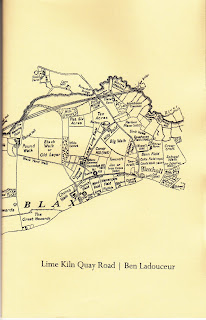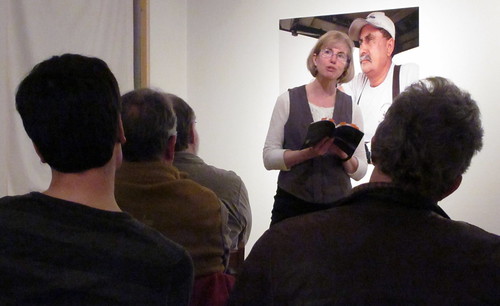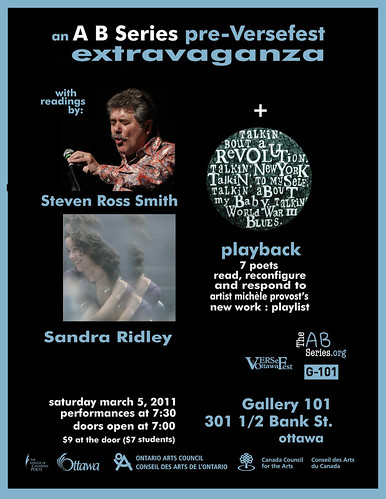 Impossible Books (the Carleton Installment)
Impossible Books (the Carleton Installment) Stephen Brockwell
Ottawa: above/ground press, August 2010.
Stephen Brockwell’s “Impossible Books project” (this above/ground book is its second installment) is an ongoing series of individual poems that are presented as excerpts from imagined “impossible” books. The impossible books of this installment range from Prime Minister’s Nursery Rhymes for Insolent Children, to the Evangelical Handbook for Engineers, to Metonymies: Poems by Objects Owned by Illustrious People, and Pindaric Odes to the Objects of Science, among others. This brief collection of ten poems is imaginative and surprising on every page.
“Animal Crackers,” from Prime Minister’s Nursery Rhymes for Insolent Children, is ripe with the pride, violence, and fierce control of image and language that are recognized now as markers of Stephen Harper’s Canadian Government (a newly-majority Government since the publication of this book):
Shrikes impale mice on barbed wire.
Weaning calved keen.
Wild male chimps murder babies.
Silverbacks preen.
The political edge of many of these poems is unsurprising from Brockwell, who co-edited Rogue Stimulus: The Stephen Harper Holiday Anthology for a Prorogued Parliament with Stuart Ross during Stephen Harper’s second prorogation of Parliament. The sorts of biting, angry, but smart and focused critiques offered in these poems are vital today, and will be increasingly so over the next four years of Harper’s current majority.
Another recognizable bent in Brockwell’s work is his interest in interrogating the seemingly cold language and images of science for available (and potential) emotional currency:
At least one molecule of you in me
passed through the body of some great person,
in the urine of Josef Stalin, say,
on an October morning in his youth;
it may be one I am passing on now
as a drop of saliva flies from my tongue
over this paper. (from Pindaric Odes to the Objects of Science)
Where language overlaps with the body is a fruitful site for Brockwell:
It is after all a word,
the tongue on the teeth,
the open mouth,
the teeth biting the lips,
until they bleed. (from The Love Poems of ____, Serial Killer)
At these intersections (language/body, language/science), Brockwell points at a handful of the small manners in which people are connected physically, if inadvertently.
The two most exciting poems here, to my ear, come from The Archives of Ministry of Spiritual Ascendance, in the form of two applications for the position of God. In these two poems the reader is offered modest acts of growth and selflessness mixed with fatigue:
1027-3F, December 12, 2024
Dear Ministry of Spiritual Ascendance,
I believe I should be accepted for God
because I have never eaten meat.
I cultivated tomatoes at my window
from a pack of ancient seeds.
I nurtured them to the size
of vitamins with water I filtered
from the rain. That Saturday morning
I prayed for the Sun as I am sure
so many do every day but I prayed
for others not for myself
and the Sun appeared for at least
one minute through the smog.
All my life I have shared the gifts I have received.
But I am so tired – please accept this
application for God.
The success of this book rests in its brevity. None of the “jokes” overstay their welcome, with only one or two poems from each “Impossible Book” presented. These are serious poems that rise above the humour and novelty of their initial idea(s). The first installment of the series was given at the Olive Reading Series in December 2007. I’ve not seen that chapbook, but I imagine in hope that Brockwell is sitting on further installments that we may be lucky enough to see in print someday.
L ime Kiln Quay Road
ime Kiln Quay Road
Ben Ladouceur
Ottawa: above/ground press, May 2011.
Ben Ladouceur has had a wonderful nine months since returning to Ottawa following a year spent working in Suffolk, England. He gave a widely heralded reading on the opening night of Versefest alongside Michael Dennis, in April he read as part of University Night at Tree Reading Series, the chapbook self-portrait as the bottom of the sea at the beginning of time was published by The Moose & Pussy, and now Lime Kiln Quay Road is seen in to print by rob mclennan’s above/ground press, not to mention chapbooks before his departure: Alert (AngelHouse Press, 2010) and The Argossey (published by my own Apt. 9 Press—full disclosure).
Lime Kiln Quay Road sees him working further in serial forms, marrying concise individual pieces with breadth and larger project conception. It is a book concerned with growth (or more accurately, stuttering and failing growth):
There was a rock rumoured to grow
one inch every year.
It was a letdown.
In these poems, set in the countryside around the hostel in Suffolk where Ladouceur was employed, the reader finds stagnation and boredom, as well as questions of intention and consequence:
The indifferent roads collect rain
in depressions caused by tires
and make the drive tricky
but it’s neat
that the depressions exist
that when you go somewhere
everything behind you
is a little bit flatter.
Of course
that’s easy for me to say,
I never did the driving.
In the stagnant (though often beautiful) landscape, the figures of these poems develop sensitivity to the movement of their own identities:
We occupy the eye
in quietude of storm
wet weather soft against our roof
like gavels wrapped in satin
it’s the eye that is moving.
For now we are still.
There is an disconnect between the bodies of the figures and the landscape, one that undermines predictable expectations of poetry located in the rural or pastoral settings, as was an insistence upon the presence of the lower bodily stratum that grounds much of Ben's work in the body itself:
It isn’t as though a tree
will sprout there
a very acidic and thankful tree
made of all the liquids
our bodies didn’t need.
That sort of thing doesn’t happen.
In Ottawa, those paying attention have known that Ben is a poet to follow. We have been lucky to have the opportunity to watch this work develop. Lime Kiln Quay Road makes plain that Ben is already fulfilling his vast promise. He has strong control over the developing momentum of this book, as well as the turns that startle the reader. With above/ground press’s famously large network of distribution, this book will hopefully catch the eye of some new readers around the country. Heads up, folks.


















